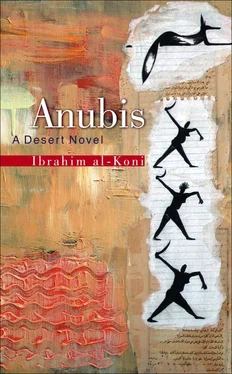As I continued crawling, the earth grew firmer with slabs of rock here and there. Next to a shrubby retem, on some rocky ground, I discovered a pile of dung. The dung was fresh, so fresh that moisture dripped from it as I crushed it between my fingers. Beside the pile of dung, on the hard surface, there gleamed an astonishing liquid that seemed a legendary treasure. Vapor hovered over it, and I feared it would all evaporate. I fell on it and began to lap it up. It tasted bitter, but I consumed all of it. As I felt it circulate through my body, my blurred vision began to clear. When I regained my sight, I noticed the gazelle, which was standing beside the retem tree, looking haughtily toward me. No, that’s not right: its haughtiness was suggested, rather, by its posture. What I observed in its large, intelligent, black eyes was an inscrutable mystery. Were they really eyes, or, a strange well that spoke in that painful language, the true language: the forgotten language? I felt inspiration course through my body just as the gazelle’s urine had. I found within me the ability to understand, the ability to comprehend the forgotten language, which reconciled my tongue with the gazelle’s, united my destiny to the gazelle’s, and created from my spirit and the gazelle’s a single spirit. It was only at this moment that the coal burst into flame and that the revelation achieved a perfect form in my heart. I remembered that a tragic story from bygone generations recounted how Wannas turned into an odious creature with the head and body of a ghoul, because he had disobeyed the advice of his sister Tannas and — when overcome by thirst during his return to the campsite where he had forgotten his amulets — had drunk the urine of a gazelle. Still chewing, the gazelle’s spectral figure advanced toward me. Perhaps she was chewing her cud. She drew ever closer with her haughty figure. She was gazing into the unknown, and this expression added to the profundity, seduction, and splendor of her eyes. It was a splendor we observe only in eyes that have gazed into the eye of eternity till absence becomes second nature to them. Her black eyes grew wider and turned into a brilliant, distressing, unfathomable lake. I drank as greedily from them as I had drunk the urine moments before. I began to liberate myself, not only from pain, bitterness, and weakness but from my body as well.
I threw myself into this lake, into the sea of brilliance, distress, and mystery. Instead of a sweet sense of being inundated, I felt myself become a feather, fluttering back and forth between earth and sky.
I AWOKE FROM my sleep, feeling shattered … the way a person feels when wresting himself from the jumbled confusions of a nightmare. My body seemed sunk in the ground, as if buried under a mountain, and my limbs felt like rocks. My head throbbed with unbearable pain, and my tongue was paralyzed. Although I could open my eyes, my tongue refused to budge. What was the meaning of this?
I found myself imprisoned inside a tent within a tent. Even though I was restrained, I could see outside, through the entrance, and discern the time of day. I observed that the prophecy of Ragh was a timid flow moving through the empty countryside and therefore assumed it was morning. Was it a birth? Was it my first birth or my second? If it really was a birth, it must have been my second, since a quiet voice informed me that I had been born before. Light’s prophetic message, which my eyes discerned outside, was not a lie, because its root was a hidden revelation, planted so deep in my heart that I had no right to doubt it. Another revelation was unveiled in my chest, saying that I could doubt anything except my inspiration, no matter how much I wanted to, since this would mean betraying myself.
Then … then my heart’s revelation unveiled another treasure, for I remembered a matter of sublime importance; I remembered that I had been free. How had I become a captive? I remembered that I had liberated myself from all my burdens and had shot off. I remembered that I had floated freely through space, because I had been able to rid myself of the snail’s shell that harbored me. What cunning had trapped me in the snare once again? How had my liberation been effected, how had it so transformed me that I could roam freely with neither body nor tongue, and how had this liberation changed into a tribulation that constricted my breathing as if I were weighed down by a mountain?
Then I heard a voice say clearly, “This is the price of departure.”
At first, I thought that this voice issued from my chest rather than my tongue, because I was certain that my tongue was paralyzed and had not stirred. This prophecy, however, was repeated with even greater clarity, and I was able, with some effort, to ascertain that it originated with a figure — crouching in a corner of the tent — who had borrowed his features from the denizens of the spirit world. A black veil enveloped his head, and an amulet chain, which was thrust into a leather pouch, protected his body. His head was crowned with a talisman, as were his shoulders. His chest was decorated with an awe-inspiring string of these talismans. His forearms were also safeguarded by two more. Had it not been for this alarming concentration of charms, I would have assumed he belonged to one of the jinn tribes that populate the desert from Tinghart to Tiniri, but concern with the forefathers’ symbols buried in these districts is a matter reserved for human priests alone.
At that moment my tongue sprang to life with a facility that took me by surprise. I heard myself ask, “To which departure does my master refer?”
The question did not surprise him, I sensed, nor was he surprised by the liberation of my tongue. He proceeded to draw some designs on the ground. Then he replied, without looking my way, “A departure to search for a father.”
“But … who are you?”
He glanced at me for the first time, and I saw in his eyes everything that should appear in the eye of a genuine priest: mystery, sorrow, prophecy, and the pain that is said to be married to every prophecy.
He replied, “You would do well to ask yourself, ‘Who am I?’ instead of asking me, ‘Who are you?’”
I thought that the pained look in his eyes intensified then and almost turned into real suffering. I was touched by his pain but could not grasp its cause. Then I discovered he was correct: I could not say anything for certain about myself or the world, despite the precious revelation granted me that I had been born one day, had gained knowledge one day, and had been liberated one day.
I said, “You’re right, master. Who might I be?”
“I almost lost the world to return you to the world.”
“I don’t understand.”
“Don’t you remember anything at all?”
“I remember that I was free!”
I caught the gleam of a smile in his eyes. He faced toward the entrance to allow his eyes to roam the vacant wasteland. He replied, “You’re not mistaken about that. You truly were free. You were so free that you almost lost yourself on account of this freedom.”
“Does freedom cause us to lose ourselves, master?”
“Freedom, my son, is about living, not about dying.”
“But I was happy.”
“Happy like a living person or a dead one?”
“Enshrined in my memory is the treasured saying of a wise man who claimed that in happiness life becomes equivalent to death.”
“Watch out! True heroism is to live, not to die.”
“Are you saying that heroism is living, not dying?”
“Absolutely.”
“I like that, but is it possible for us to find a place for freedom in this heroism?”
“Where did you get your ability to debate? Unless he’s well along in years, it’s inappropriate for a man to pelt a priest with questions.”
Читать дальше












